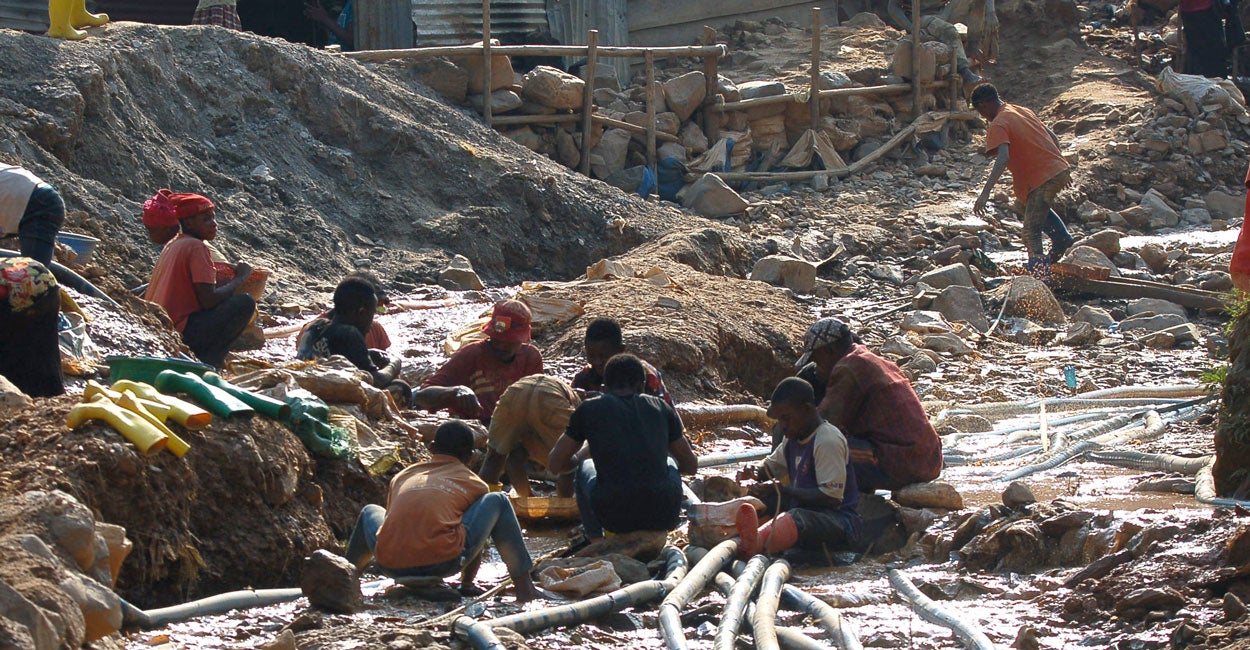


America is at an energy crossroads, and with the One Big Beautiful Bill Act—landmark legislation aimed at unleashing domestic energy production, securing critical mineral supply chains, and reducing costs for American families—we have a pivotal opportunity to reshape not only our economy, but also the global moral landscape. Currently, the clean energy revolution is being built on the backs of enslaved children and at the cost of strengthening China.
While we celebrate Independence Day and the “land of the free,” nearly 50 million people globally are living in modern slavery—including more than 12 million children subjected to forced labor, sexual exploitation, and domestic servitude. Human trafficking is the fastest-growing criminal enterprise in the world, generating an estimated $236 billion annually.
In the Democratic Republic of Congo, many of those children are mining cobalt—a mineral vital to producing lithium-ion batteries for electric vehicles, smartphones, and solar panels.
As American children spend their summers in pools and at beaches, over 40,000 children as young as 6 years old are working in hot, dangerous, exploitative conditions in Congo’s cobalt mines. These children are exposed to toxic dust, long hours, physical beatings, and even death in collapsed tunnels—all for wages as low as $1 to $2 per day.
And guess who owns most of these mines? China—and it gets worse. China sends back the rare minerals to be processed in the Xinjiang region for the production and processing—including cobalt and lithium—where it uses slave labor from the Uyghur people it has detained and forced to work in mining, manufacturing, and construction under genocidal conditions.
Chinese companies now control most of the industrial cobalt mines in Congo and dominate refining operations globally. Forty-one percent of all cobalt-containing batteries were produced in China, which is also the source of nearly 90% of the world’s refined rare earth elements. These supply chains are deeply opaque and resistant to scrutiny—a fact that enables continued exploitation.
Children are quite literally the canaries in the cobalt mine.
In September 2023, the Interagency Working Group on Mining Regulations, Laws, and Permitting released a report with many recommendations which curtailed domestic mineral production and strengthened U.S. adversaries like China.
Rep. Derrick Van Orden, R-Wis., highlighted this strongly in two hearings in the previous Congress regarding cobalt mining in Congo, emphasizing the Biden administration’s role in subsidizing child slavery to achieve their ambitious goal of making 50% of all U.S. vehicles electric by 2030.
Rep. Burgess Owens, R-Utah, proposed an amendment to HR 4821, stating, “The U.S. must recognize the importance of a strong minerals supply chain and the dangers of reliance on adversaries. Other countries are investing in domestic production, while we lack a long-term strategy. We should support our domestic producers and aim for global leadership in mineral mining, rather than reinforcing China’s dominance.”
Ironically, the 2022 U.S. State Department Trafficking in Persons Report chose as a primary feature “Forced Labor and the Clean Energy Transition: Finding a Responsible Way Forward.” Unfortunately, this conflicting messaging received little attention, but did demonstrate bipartisan unity that clean energy should not be fueled by slave labor. This March the bipartisan Congressional-Executive Commission on China also laid bare the scope of these abuses and urged the U.S. government to impose sanctions on companies complicit in child labor and to reorient clean energy policy away from minerals tied to human rights violations.
The moral cost of inaction is immense—but so is the strategic cost. The FBI director and MI5 director general delivered an unprecedented joint statement in July 2022—as the world focused on Russia—saying that China poses the “biggest long-term threat” to Western security, outpacing even Russia in its economic espionage and global influence strategies. Dependence on Chinese-controlled supply chains leaves the U.S. vulnerable not just to human rights abuses but also to blackmail, sabotage, and coercion.
This is why the One Big Beautiful Bill Act matters so much. For the first time in decades, the U.S. is asserting its energy sovereignty by expanding domestic mining, refining, and innovation while reducing reliance on foreign adversaries. The bill strategically decouples U.S. clean energy from China’s dominance in critical supply chains—where reports show child and forced labor, especially in Xinjiang’s polysilicon production. By investing in transparent, traceable supply chains, it aligns American energy policy with our values on human rights and labor protections.
Energy independence is national security. The bill ensures America doesn’t rely on adversarial nations for the tools of the future—from EV batteries to solar panels. It also supports domestic manufacturing hubs, creating thousands of secure energy jobs on U.S. soil and reducing vulnerabilities in times of global conflict or disruption. It sets a new precedent: Climate action must never rely on exploitation or compromise national security.
Without this kind of legislation, America’s clean energy transition risks being built on the backs of trafficked laborers and exploited children abroad. The Big, Beautiful Bill flips the script—proving we can lead in clean energy without compromising our principles.
The moral crisis unfolding in the shadows of our supply chains is the real crisis for humanity. It is not enough to power our homes and cars with clean energy; we must ensure that energy is free from the stain of slavery. That means decoupling our supply chains from autocratic regimes that abuse human beings for profit and rebuilding them with allies who share our values. Americans should not be forced to choose between saving the planet and standing up for human dignity.
The future of clean energy must be clean in every sense—morally, environmentally, and strategically. The Big, Beautiful Bill is a powerful first step. Now it’s time to build on that momentum and lead the world in creating an energy future that is powered by freedom, not forced labor.
We publish a variety of perspectives. Nothing written here is to be construed as representing the views of The Daily Signal.
